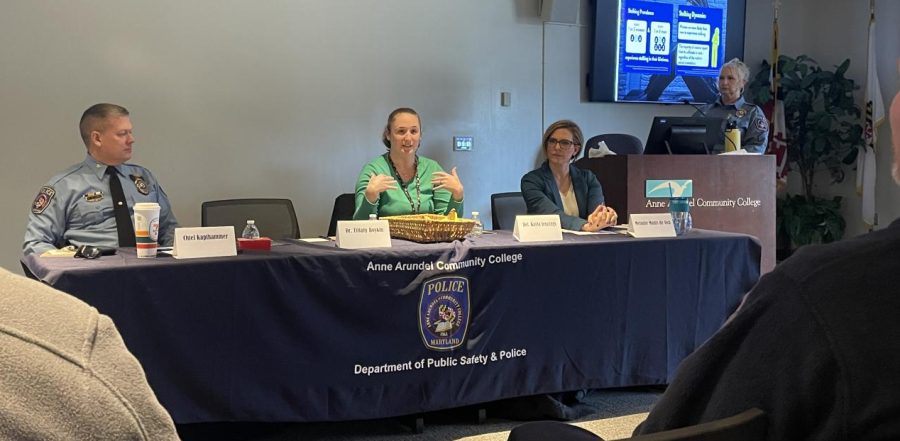Cops, survivors, give advice in stalking panel
From right to left, AACC Police Chief Sean Kapfhammer, Anne Arundel County Police Detective Kayla Jennings and AACC Compliance Officer Melanie Monts De Oca, a stalking survivor, share advice in an awareness panel at the Arnold Campus on Thursday. Victims of stalking can file a report with AACC police by calling 410-777-1818.
January 26, 2023
This story contains mentions of violence and stalking.
A stalking survivor who works at AACC advised students and faculty to “be observant of your surroundings of yourself and others” on Thursday.
Melanie Monts De Oca, an AACC accessibility compliance officer, told a campus audience a stalker tried to follow her home after work one day, so she drove to a grocery store, where he followed her inside and she called the police.
In the incident, which occurred in the 90s when she worked as a strength coach for Florida State University’s football team, “I trusted my instincts when I noticed that I just felt something was off,” De Oca said, adding her situational awareness helped keep her safe that night.
“I was very lucky, because that’s not the case for other people,” said De Oca, whose father was a police officer.
De Oca spoke alongside stalking experts at a panel hosted by AACC Public Safety to give advice and promote awareness.
The panel featured AACC Police Chief Sean Kapfhammer and Anne Arundel County Police Detective Kayla Jennings, who specializes in domestic violence and stalking.
Kapfhammer and Jennings said two important things students can do if they think someone is stalking them are to be firm in telling the potential stalker the attention is unwanted, and to document all interactions as well as save the messages sent to them by the person.
“They have to warn the potential stalker,” Kapfhammer said. “Some people don’t understand social cues.”
Jennings agreed, saying while “it’s tough to hurt someone’s feelings,” it’s neccesary in these cases to be direct.
Jennings added documenting is “the biggest thing” to do so law enforcement can get involved and protect the victim.
“It’s really hard to find that fine line between unwanted attention and stalking,” Jennings said. “Stalking is really, really, hard to prove. That’s why documentation is important.”
Kaphammer said while stalking-related incidents are one of the most common things AACC Department of Public Safety and Police deals with. In October, campus police took three reports of stalking incidents.
But, the chief added, the situation is usually resolved after Lt. Gary Vernon has a “sit down” with the suspect and explains the consequences if continuing to harass the victim.
“Gary sets them straight,” Kapfhammer said. “We’ve had a 100% success rate with this. We’ve never had a young man bother another girl again after Gary has a chat with them.”
Some AACC students said it’s good for the college to host panels like this one because they raise awareness for the issue and empower the victims to speak up about their experiences.
“The college has people from all different sorts of backgrounds,” second-year computer science student Rebecca Broomfield said. “It’s important to hear their stories, so that other people can relate to that and be more open about their own stories and experiences.”
Second-year nursing student Arianna Sessoms agreed, saying events like the panel contribute to making AACC a place where students feel safe.












